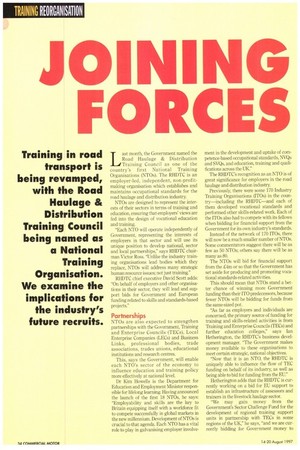;0 11 NG FORCES
Page 46

Page 47

If you've noticed an error in this article please click here to report it so we can fix it.
Last month, the Government named the Road Haulage & Distribution Training Council as one of the country's first National Training Organisations (NTOs). The RHDTC is an employer-led, independent, non-profitmaking organisation which establishes and maintains occupational standards for the road haulage and distribution industry.
NTOs are designed to represent the interests of their sectors in terms of training and education, ensuring that employers' views are fed into the design of vocational education and training.
"Each NTO will operate independently of Government, representing the interests of employers in that sector and will use its unique position to develop national, sector and local partnerships," says RHDTC chairman Victor Ross. "Unlike the industry training organisations lead bodies which they replace, NTOs will address many strategic human resource issues; not just training."
RHDTC chief executive David Scott adds: "On behalf of employers and other organisations in their sector, they will lead and support bids for Government and European funding related to skills and standards-based projects."
Partnerships
NTOs are also expected to strengthen partnerships with the Government, Training and Enterprise Councils (TECs), Local Enterprise Companies (LEC,$) and Business Links, professional bodies, trade associations, trades unions, educational institutions and research centres.
This, says the Government, will enable each NTO's sector of the economy to influence education and training policy more effectively at national level.
Dr Kim Howells is the Department for Education and Employment Minister responsible for lifelong learning. Having announced the launch of the first 18 NTOs, he says: "Employability and skills are the key to Britain equipping itself with a workforce fit to compete successfully in global markets in the new millennium. Development of NTOs is crucial to that agenda. Each NTO has a vital role to play in galvanising employer involve
ment in the development and uptake of competence-based occupational standards, NVQs and SVQs, and education, training and qualifications across the UK."
The RHDTC's recognition as an NTO is of great significance for employers in the road haulage and distribution industry.
Previously, there were some 170 Industry Training Organisations (IT0s) in the country—including the RHDTC—and each of them developed vocational standards and performed other skills-related work. Each of the ITOs also had to compete with its fellows when bidding for financial support from the Government for its own industry's standards.
Instead of the network of 170 IT0s, there will now be a much smaller number of NTOs. Some commentators suggest there will be as few as 50 NTOs; others say there will be as many as 80.
The NTOs will bid for financial support from the Ltm or so that the Government has set aside for producing and promoting vocational standards-related activities.
This should mean that NTOs stand a better chance of winning more Government funding than their ITO predecessors, because fewer NTOs will be bidding for funds from the same-sized pot.
"As far as employers and individuals are concerned, the primary source of funding for training and skills-related activities is from Training and Enterprise Councils (TECs) and further education colleges," says Ian Hetherington, the RHDTC's business development manager. "The Government makes money available to these organisations to meet certain strategic, national objectives.
"Now that it is an NTO, the RHDTC is uniquely able to influence the flow of TEC funding on behalf of its industry, as well as being able to bid for funding from the EU."
Hetherington adds that the RHDTC is currently working on a bid for EU support to establish an infrastructure of assessors and trainers in the livestock haulage sector.
"We may gain money from the Government's Sector Challenge Fund for the development of regional training support units in partnership with TECs in some regions of the UK," he says, "and we are currently bidding for Government money to undertake a major piece of labour market research in this industry. This research is important because its results will help us in our ongoing campaign on the industry's behalf to gain more public funding to address potential skills shortages in this industry.
"Central to an NTO's role is its ability to obtain quality information about its industry and use it to secure more support from the Government."
Allowing for regional variations, employers can currently gain support of between £2,500 and .£6,000 for each modern apprentice they employ. Hetherington says that, similarly, TECs also expect to support young people who become "national trainees" when this scheme is launched in the autumn.
"This will also mean that employers in our industry can expect TEC support for those who are on the Young I..GV Driver Training Scheme," he adds.
Importantly, because most publicly-funded training must now he approved nationally and then managed by an NTO, industries without an NTO will not be able to develop occupational and vocational standards, instigate and administer schemes. This would leave such an industry at a severe disadvantage in trying to promote careers and skills development in its sector, as well as trying to attract central funding.
"As training providers operating in the road haulage and distribution industry, we are delighted that the RHDTC has become an NTO," says Alan Clay, training manager with specialist road transport trainer RTT Training Services of Ipswich. "The RHDTC has built up an excellent—and enviable— relationship with training providers over the years.
"It understands what the industry wants and what training providers need to offer. And it is never afraid to consult with the industry to assess companies' skills needs and ask for suggestions on how best to meet these needs." Formed nearly seven years ago, the RHDTC has put in place the first national training framework in the history of the industry.
Scott explains: "This includes working jointly with industry employers and other bodies, including trades unions, to produce a comprehensive set of occupational standards for the industry; establishing a number of formal entry points to the industry for young people (through Modern Apprenticeships, the Young WV Driver Training Scheme, and so on), and establishing a formal, nationally recognised vocational qualification structure (NVQs/SVIZ)s at levels 1 to 4 inclusive).
Career structure
"We have also established, and are promoting, a formal career structure, including career paths for those in driving, traffic operations, warehousing, supervision and management. And we are promoting competitiveness-based initiatives, such as Investors In People and Sector Targeting, throughout the industry."
Ross and Scott are keen to stress that the RHDTC has developed a close working relationship with, among others, employers of all sizes, training providers, the Department for Education and Employment, and the Department of Transport.
"It has achieved this in partnership with the industry's major trade associations, the Freight Transport Association, the Road Haulage Association and the British Association of Removers," says Ross, "with the aim of securing the best possible longterm future for the road haulage and distribution industry."
7 by Bob Little
















































































































